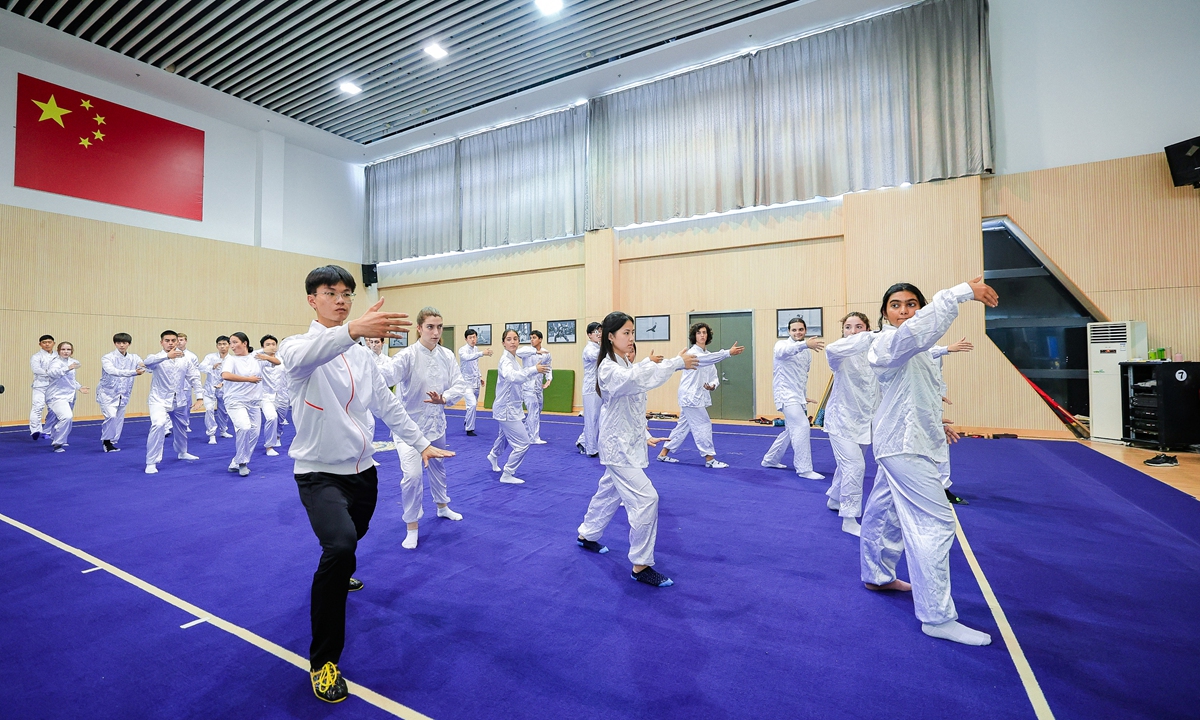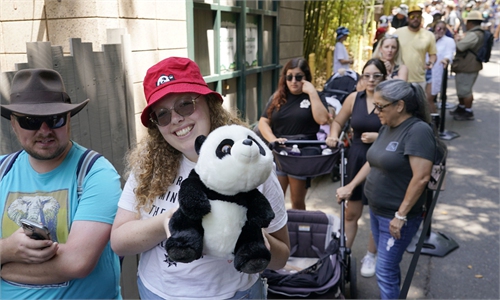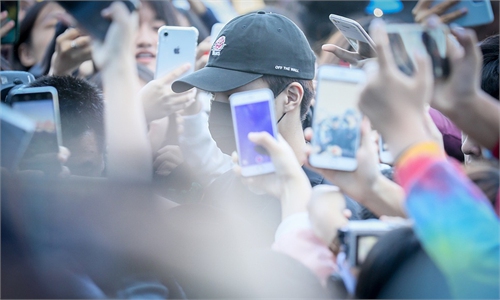ARTS / CULTURE & LEISURE
US youths embrace authentic China in exchange program
Top university students experience rich culture, warm hospitality

US and Chinese students practice tai chi together at the Sports Center of Nanjing Agricultural University in Nanjing, Jiangsu Province, earlier in August. Photo: Courtesy of Duke Kunshan University
"It has been so great getting to see the authentic China, meeting authentic people, and having these conversations that I think are so important to the future of both countries," Anne Dillon, a freshman majoring in Public Policy and Environmental Science at Duke University, shared her enthusiasm for the unique cultural exchanges she has experienced in China.Dillon is among a group of 90 students and faculty from eight top universities, including Duke University, Columbia University, Brigham Young University, and the University of Michigan, who traveled to East China's Jiangsu Province for an exchange program.
Featuring a week-long series of cultural activities across cities like Kunshan, Suzhou, Wuxi and Nanjing, the "Collegiate Immersion Bootcamp for US-Based Institutions to Jiangsu," jointly organized by the Foreign Affairs Office of the Jiangsu Provincial People's Government and Duke Kunshan University, just concluded in Nanjing.
During their stay, the students visited iconic sites around the province, including the Grand Canal, Zhouzhuang Ancient Town and the Suzhou Museum.
"I have really been surprised by the amount of canals and river systems that are around Jiangsu Province," Katherine Dillon, a junior majoring in History and Spanish at the University of Michigan-Ann Arbor, told the Global Times. When reflecting on her trip to the ancient water town, she said, "It's been so hot during the day, but going at night has been really beautiful."
Yunjin, or Yun brocade, is a traditional Chinese silk brocade made in Nanjing. With a history of more than 1,600 years, it's famous for its exquisite craft, elegant designs and smooth texture. At the Nanjing Yunnjin Brocade Museum, students participated in hands-on activities such as traditional Yun brocade weaving.
At a local museum, Cole Kannam, a freshman majoring in Statistics at Duke University, learned about the Nanjing Massacre, which took place when Japanese troops captured the then-Chinese capital on December 13, 1937. Over six weeks, they killed about 300,000 Chinese civilians and unarmed soldiers in one of the most barbaric episodes of World War II.
"The memorial itself was also incredible to me because that's a perspective of World War II that you don't hear as an American," Kannam told the Global Times.
The exchange program aimed to promote meaningful interactions between the visiting US students and their Chinese counterparts. US students engaged in discussions with local university students on topics ranging from artificial intelligence to green energy and urban renewal.
During the visit to East Zhonghua Gate Historical Culture Block, the students exchanged views on various topics and bonded over shared interests, such as the popular US TV series Friends. Kannam highlighted how they bonded through music, noting that he and local students sang Taylor Swift songs together.
The sisters also had the chance to learn about traditional Chinese practices, such as tai chi, a centuries-old Chinese martial art that has been recognized as part of UNESCO's cultural heritage, at the Sports Center of Nanjing Agricultural University.
"It took us a long time to do a very simple maneuver that I will not repeat for the camera, but it was so cool," said Anne Dillon.
The sisters, along with other students, also embraced the local cuisine, including trying chicken feet, which they described as "surprisingly good."
Reflecting on her experience, Anne Dillon expressed a desire to reciprocate the hospitality she received. "I hope we can return the favor and welcome DKU's students and other Chinese students to the US," she said.
"People are so open to sharing their culture and want us to learn and partake in it. Not only do we get to watch experts do it, but we also get to try it ourselves. That's something I won't forget - how welcoming everyone has been," said Anne Dillon.
Kannam encouraged other US students to come to China in person.
"There are a lot of opportunities being implemented to provide for American students and students also in other parts of the world. I would say don't be afraid and come over here. There's a lot to learn, a lot to relate with. The learning curve isn't as steep as I thought it might have been," he added.



